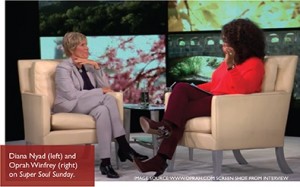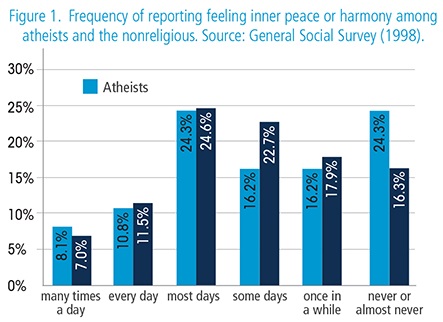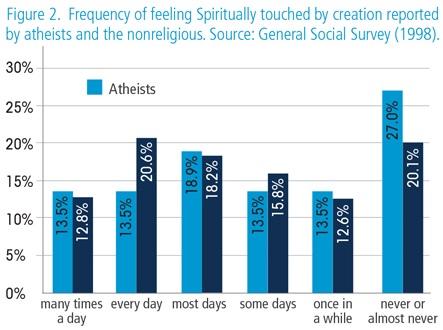The Oprah-Nyad Affair How Do Atheists Experience Wonder and Awe?
 © Tetyana Kochneva | Dreamstime.com
© Tetyana Kochneva | Dreamstime.com Atheists have one thing in common: they lack a belief in any god. But that commonality tells us very little about what they do believe and what they do experience in lieu of the divine. For instance, do atheists have experiences they consider “spiritual” or awe-inspiring? And if one doesn’t believe in a god but does believe in some kind of connection between humans, animals, the sun, the earth, and its oceans, can they still claim to be an atheist? These two questions were recently raised following an interview with long-distance swimmer Diana Nyad that aired October 6 on Oprah Winfrey’s show, Super Soul Sunday.
The part of the interview that received the most attention was the exchange between Winfrey and Nyad over Nyad’s atheism:
Oprah Winfrey: You told our producers that you’re not a God person; that you’re a person who is deeply in awe.
Diana Nyad: Yeah, I’m not a God person…
OW: Do you consider yourself atheist?
DN: I am an atheist.
OW: But you’re in the awe.
 DN: I don’t understand why anybody would find a contradiction in that. I can stand at the beach’s edge with the most devout Christian, Jew, Buddhist—go on down the line—and weep with the beauty of this universe and be moved by all of humanity. All of the billions of people who’ve lived before us and have loved and hurt and suffered… To me, my definition of God is humanity and is the love of humanity.
DN: I don’t understand why anybody would find a contradiction in that. I can stand at the beach’s edge with the most devout Christian, Jew, Buddhist—go on down the line—and weep with the beauty of this universe and be moved by all of humanity. All of the billions of people who’ve lived before us and have loved and hurt and suffered… To me, my definition of God is humanity and is the love of humanity.
OW: Well, I don’t call you an atheist then. I think if you believe in the awe and the fwonder and the mystery, then that is what God is… not a bearded guy in the sky.
Many nontheists criticized the talk-show host for this exchange because it denies Nyad’s atheist identity. Indeed, Winfrey deserves to be criticized for denying her guest the right to self-identify as an atheist. But there are two additional elements of the Oprah-Nyad affair that I believe warrant additional attention. First, while most of the public commentary targeted Winfrey’s dismissal of Nyad’s atheism, there was also some criticism of Nyad for claiming to be an atheist while indicating that she holds “spiritual” views. Second, virtually no one in the media commented on Winfrey’s unorthodox suggestion that God is not “a bearded guy in the sky.” Before we examine these two specific points further, it’s worth asking generally whether atheists and nonreligious people in the United States report experiencing wonder and awe, and if these are appropriately termed “spiritual” feelings.
Unfortunately, though perhaps not surprisingly, I was unable to find questions that had been posed to representative samples of Americans that perfectly capture what “spirituality” means. Incidentally, in her 2010 book, Science Vs. Religion: What Scientists Really Think, Elaine Howard Ecklund does provide data on atheist scientists who report experiencing wonder and awe at things like the immensity of the universe and the diversity of life, though they were reticent to call those experiences “spiritual” as they defined them as natural, not supernatural. (Personally, I’m not surprised that the majesty of scientific findings and understandings of the universe overwhelms people; it helps illustrate how insignificant humans are relative to the universe around us.)
By now we’re all familiar with the rise of the so-called “nones” in the United States—those who answer “none” when asked their religious affiliation. In 2012 the Pew Research Center’s Forum on Religious and Public Life survey revealed that, of the 46 million unaffiliated American adults surveyed, more than half reported a deep connection with nature and the earth, and 37 percent claimed they were “spiritual but not religious.” Thirty percent of nones said they believed in spiritual energy located in physical things like mountains, trees, or crystals; 25 percent claimed a belief in both astrology and reincarnation; and 28 percent regarded yoga as a spiritual practice.
But what about those who explicitly identify as atheists or agnostics? In the same 2012 Pew survey, 34 percent said they were spiritual and 38 percent said they believe in “God or a universal spirit.” However these groups didn’t respond to specific questions about how they define spirituality.
Despite not finding perfect polls to address this issue, I did find several questions in the 1998 General Social Survey—a nationally representative face-to face survey of adult Americans conducted every other year by the National Opinion Research Center at the University of Chicago—that are closely related to the idea of spirituality. Two of the questions capture the idea of wonder and awe, but are somewhat problematic in that they were phrased in such a way as to be more appealing to religious people. Both were introduced with this setup: “The following questions deal with possible daily spiritual experiences. To what extent can you say you experience the following…?” Response options ranged from “many times a day” to “never or almost never.” Survey participants were first asked to what extent they “feel deep inner peace or harmony.” As noted, the wording is likely appealing to religious people—particularly Buddhists but also Christians—who are often instructed to seek inner peace and harmony. Even so, atheists and the nonreligious also answered the question. The responses were mixed, as shown in Figure 1 below. Only about a quarter of atheists said they never experienced inner peace or harmony, and just 16 percent of the nonreligious reported never experiencing such feelings. On the other end, about a quarter of both groups reported feeling inner peace most days.

The second question was even more clearly directed toward the religious: “I am spiritually touched by the beauty of creation.” However, even though spirituality and creation are often problematic concepts for atheists and the nonreligious, 75 percent reported feeling touched by the beauty of creation at least once in a while.

What these survey results indicate is that most atheists and nonreligious Americans do experience so-called spiritual feelings that are very similar to the wonder and awe expressed by Diana Nyad in her interview with Oprah Winfrey. Of course, experiencing wonder and awe—or feeling touched by things or having a sense of inner peace or harmony—doesn’t mean these individuals must believe in God or anything supernatural. To the contrary, what these data indicate is that such feelings are natural in both a “caused by nature” and a “highly common” sense. In short, a substantial portion of atheists and nonreligious report spiritual feelings.
Returning to Nyad’s own personal spirituality, later in the interview Winfrey asked her if she was spiritual and Nyad said that she was. Here’s Nyad’s explanation:
I think you can be an atheist who doesn’t believe in an overarching being who created all of this and sees over it. But there’s spirituality because we human beings, and we animals, and maybe even we plants—but certainly the ocean and the moon and the stars—we all live with something that is cherished and we feel the treasure of it.
The swimmer reaffirmed this idea when prompted by Winfrey:
OW: Do you feel one with the ocean? At some point do you just feel like there’s no difference between your body and your stroke and the water and the surroundings around you?
DN: I do. I feel at home in the ocean. Not in a pool. Not in a river, not in a lake, but the ocean. I actually feel the tidal pull. And I feel the moon pulling the tides out there. It’s what mountain climbers feel when they get to the top of the mountain; not that they conquered it, but that they are part of it.
Note that in both of these statements, Nyad never suggests that she believes in anything explicitly supernatural. She simply suggests that there is “something” that connects her to the ocean, plants, animals, the moon, and stars. What that is she agrees to call “spirituality,” but that doesn’t mean she believes it to be supernatural or divine.
Even so, Nyad’s admissions caused consternation among some atheist commentators, who seemed to be under the impression that atheism is inimical to spirituality. Writing at his website, Why Evolution Is True, University of Chicago biologist Jerry Coyne wrote:
In truth, I think that more damage to atheism was done here by Nyad, eloquent though she was, than by Oprah. After all, Winfrey makes just one short claim about the issue, denying that Nyad is an atheist because she believes in wonder, awe, and humanity. In contrast, Nyad calls those feelings “God,” admits the existence of souls that exist after death, and says that she has no problem with believers, even those who accept the existence of ghosts. In other words, she’s an atheist who, like Oprah, accepts woo. It’s really time for us to discard the word “spirituality.” All it does is give believers a reason to say, “See, you’re really one of us after all.”
As a sociologist, I find Nyad’s spiritual admission intriguing. Sociologists have, for several decades, drawn a clear distinction between “religiosity” and “spirituality.” The former is used to describe the many ways in which institutional religion can manifest itself in the lives of people: they can attend services, pay tithing, and/or identify as a member of an organized religion, and so on. Note that I stipulate this is an “and/or” relationship, since religiosity is multi-dimensional—people can regularly attend religious services but not believe in the teachings of their religion, like the many U.S. Catholics who reject the church’s official position on birth control but still strongly identify as Catholic. Spirituality, on the other hand, is generally used in sociology to refer to beliefs and practices—typically supernatural in orientation—that are not tied to organized religion. Examples would be things like believing you have a spiritual connection with other people, believing that there is some form of higher power, or believing that there is some form of afterlife. All of these can be held without any institutional affiliation with a religion.
Just like people can be religious in different ways, people can be nonreligious in different ways. And, there is reason to believe that people can be partially religious, partially spiritual, and partially nonreligious. In short, religiosity, spirituality, and nonreligiosity are “messy” precisely because they are human characteristics. And so Nyad is someone I would label a “spiritual atheist.” Yes, they exist. And atheists should simply accept that and welcome Nyad as an ambassador for atheism. If atheists and secular humanists reject her atheist credentials because she’s also spiritual, they’re committing the same logical fallacy that many moderate Muslims do when they argue that radical, fundamentalist Muslims aren’t “true Muslims” because they don’t share a moderate interpretation of Islam. If Osama bin Laden was a Muslim, Diana Nyad is an atheist. (My apologies to Nyad for the comparison.)
As I have repeatedly indicated, many atheists take issue with the term “spirituality” because “spirit” lies at the heart of the term and the most common understanding of the word is as a second component of human identity that is “other” than the body, a supernatural component of an individual. It is the “essence”—often called the soul—of the individual that is believed to live on after the mortal component—the body—dies. But there’s another definition of spirit: the qualities that form core characteristics of a person or potentially reflect one’s inner drive or motivation, as in “Diana Nyad has an indomitable spirit.” This doesn’t mean that Nyad has a supernatural soul but rather that she is dedicated and perseveres. Nyad’s comments on Super Soul Sunday seem, to me, to lean more toward this second definition, by which it would be more appropriate to describe her as “an atheist with spirit.” Regardless, it seems the majority of atheists and nonreligious people in the United States are indeed spiritual in the sense that they experience wonder and awe and are moved by what surrounds them.
A final point worth examining involves the complete lack of attention given to Winfrey’s statement about God not being “a bearded guy in the sky.” Some people watching the video might interpret Winfrey’s statement as a summary of her guest’s beliefs rather than her own. However, Winfrey has often espoused a spiritualism of self-empowerment and has championed New Age gurus like Rhonda Byrne (The Secret) and spiritual leaders such as the Dalai Lama. It seems likely then that she does reject the notion of God as a man with a long white beard living up above the clouds somewhere. If that’s the case, then her God is more akin to the God of twentieth-century theologian Paul Tillich, who believed in a nebulous, perhaps pantheistic deity; for him God was equal to “ultimate concerns” and was in everything good.
In the 2006 Portraits of American Life Study, participants were asked to indicate their agreement with the statement, “God is not a personal being, but more like an impersonal spiritual force.” Close to 30 percent of Americans strongly disagreed, while another 7 percent indicated they “somewhat disagreed.” A larger percentage of Americans agreed with the statement—29.8 percent strongly and 18.9 percent somewhat (13.3% were neutral). God as a personal being is the orthodox Christian position, but it’s clearly declining in acceptance in the United States, which likely explains why so little was said about Winfrey’s casual reference to the bearded guy in the sky.
Still, her denial of atheism is the major story in the Oprah-Nyad Affair. By denying Nyad’s atheism, Winfrey was denying the nonreligious identity of millions of Americans. As others have pointed out, had she done this with a Jew or Muslim or Mormon, there would have been widespread outrage. But given the outsider status of atheists in the United States, the denial was neither surprising nor widely condemned.
The fact that atheists experience wonder and awe is important for people like Oprah Winfrey to know. And perhaps for her and other Americans who don’t know an atheist (or more likely don’t know an “out” atheist), it may come as a surprise that atheists and the nonreligious experience spiritual feelings and emotions of wonder and awe. Atheists may be more analytical in their thinking and less likely to base decisions on emotions, but they are human after all.
